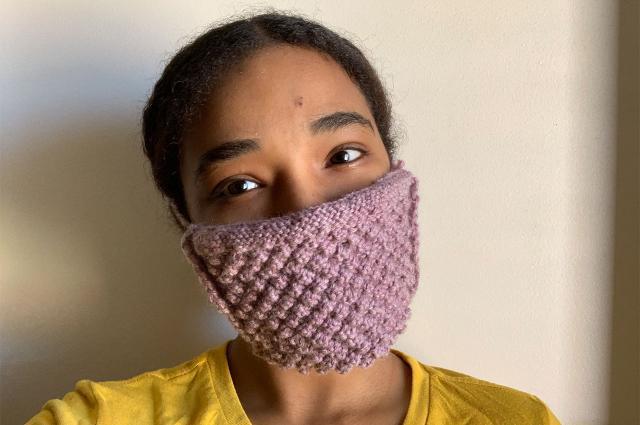The Great Pivot of Spring 2020

Keeping an Engaging, “Small-Class” Experience
ExCollege courses are capped at twenty students in normal circumstances, but we quickly realized this is still a large group for video conferencing. Instructors found that the most popular aspect of their virtual class was the use of Zoom’s breakout rooms to facilitate four-to-five person discussions. One instructor noted, “the students were clearly missing being with other students and they got a lot out of our smaller guided conversations.” Class attendance was strong across all our courses, even with students in far-flung time zones.
Hands-on and Project-Based Learning
It’s common for ExCollege courses to emphasize creative projects and research centered on students’ individual interests and passion for a topic. The move to virtual learning only made this type of work more important.
But how do you teach something like fiber arts and animal care remotely? To continue class online, for example, instructors Amy Goldstein and Kim Goldinger sent students in Sheep to Shawl home with a quickly compiled bag containing yarn, knitting needles, wool and alpaca fleece for spinning, brushes to card the fiber, and a kit to make a drop spindle. Along with weekly zoom meetings and a virtual visit to the farm, Amy and Kim found creative ways to pivot. For example, instead of in-class experimentation with natural dyes, the assignment switched to DIY dyeing with whatever students could find in their kitchens. This ranged from dyeing yarn in turmeric, red wine, avocado pits, berries, grass, and Kool Aid. Most students had never touched knitting needles, yet through videos and online coaching they all completed knitted scarves, hats, and – in the case of one student – a hand-stitched face mask!
Students in An Insider’s Guide to Food Media, taught by Tufts alum Denise Drower Swidey (A90), had no problem completing semester-long projects virtually. These included a cookbook of family recipes, an Instagram marketing guide for a mock café, and the creation of a satirical pizza brand that incorporated a message of female empowerment. Here’s one student’s blog documenting her experiences making her great aunt’s Iraqi-Jewish recipes. Another student seized on the shift to stay-at-home cooking by creating a “coronavirus kitchen” project of shelf-stable pantry recipes.
Finally, students in The Woman Suffrage Movement and How We Remember It, taught by Barbara Berenson, produced final projects that brought some overlooked history alive. For instance, after Izzy Essman, Class of 2022, returned home to the St. Louis area, she was able to visit the gravesite of Missouri suffrage powerhouse Virginia Minor, and she created a blog of her research and reflections.
In each of these cases, the support, guidance, and resources provided by instructors at the beginning of the semester eased the transition to online learning and allowed students to have meaningful experiences they couldn’t have imagined when the course began. A student in Food Media reflected, “Denise was willing to go above and beyond to make this class special, and that remained true even after the quarantine. It's a class I will never, ever forget and always think back on with fondness.”
Re-envisioning Courses and Maximizing Online Teaching Tools
Some popular aspects of ExCollege classes, such as frequent guest speakers and independent student work, can be transitioned online somewhat easily. However, it can be harder to keep the participatory dynamic that defines the ExCollege experience. That said, many of our instructors found success by leaning into online teaching practices rather than trying to replicate their course as it was. For some, that meant overhauling parts of the class into a hybrid synchronous and asynchronous model. Alma Avalle and Siddharth Jejurikar, peer instructors for Film, Philosophy, and the Search for Meaning, decided on a flipped classroom approach where students watched pre-recorded lectures ahead of time and dedicated their full Zoom session to discussions. Siddharth explained “This allowed us to still see our class once a week for a full conversation without asking them to spend too much time staring at a computer screen.”
Others found renewed engagement in Canvas discussion boards, and one instructor observed that students actually cited more sources, made more specific references to passages in the course texts, and cited each other's work more than they potentially could have in person. Students who were less vocal in class began to engage in conversations more online, highlighting the importance of providing different learners with multiple ways to participate.
Supporting Students is a Priority
Last, but certainly not least, the ExCollege is extremely proud of the ways our instructors put students’ wellbeing at the forefront and, as one undergraduate framed it, “allowed [us] to just be human.” Many took extra care to assess students’ needs during the transition, reserve time in Zoom sessions for group check-ins, and provide flexibility on assignments. These are just some of the ways in which instructors were mindful of the unprecedented challenges students faced being away from the social, emotional, and academic supports found on campus.
In return, students really stepped up. The inspiration we drew from students is best summed up by Denise Drower Swidey: “It was great to see the resilience that Tufts students have, and how they can create and innovate under even the most trying of times.”
That is the real takeaway from the spring semester. Our students are ultimately the reason why we all engage in this work, and why the ExCollege remains such a special place.